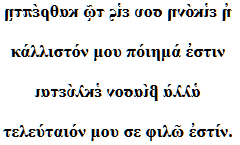Attic love poem
Καθρέπτης
ἡ εἰκόνη σου εἰς τῷ καθρέπτῃ
κάλλιστόν μου πόιημά ἐστιν
ἀλλὰ βίασον ἐκλύεται
τελεύταιόν μου σε φιλῶ ἐστίν.
by Martina Dal Zotto professor agr


→ French poem ←
Attic and boustrophedon
Attic (ancient Greek), is the dialect of Athens in the 4th and 5th century BC, here writing in boustrophédon way (alternate change of the line direction, line after line, from left to right then from right to left and so on).
The presence of the Hellenes, in the peninsula and the islands, has been attested since the 2nd millennium BC; the first written testimonies dating from this period are in Mycenaean.
Their language, close to Indo-Aryan, suggests that they migrated in successive waves from the astatic continent. It will modify, through contact with local languages which were not Indo-European, and will differentiate into numerous dialects due to the rugged geography of Greece.
The group of Ionian-Attic dialects, was the most important because it extended to numerous colonies, and also enjoyed significant literary prestige. Let us cite Parmenides, Heraclitus, Hippocrates, Herodotus and even Homer.
Properly speaking, ancient Greek, covers an archaic and a classic period which goes from -800 to -400. It is not only the classical language of Greece, and especially of Attica, but also, this against which the demotic has asserted.
Attic is the ancient Greek spoken around Athens, it is that of Euripides, Aeschylus and Sophocles.
The differences between ancient and modern Greek are not so important than the differences between old English and English.
Despite the roman domination (middle 2th century), the Attic culture will keep on going to enjoy an important prestige. The patrician families of Rome raised their children in Greek. It is also the first language of Caesar before Latin. It is in Greek that he will express himself, at the time of his assassination, and when he crosses the Rubicon.
With Christianity, Latin will secure powerful foundations, but Greek, will remain the prestigious scholarly language, for the countries of Europe.
Literature in Attic
It is in this dead language, the language of ancient Athens, that was written, classical Greek literature. The tragic poets Aristophanes, Thucydides, Plato, and Demosthenes used it. The privileged place of Athens explains that it is the Attic which was introduced by Alexander in his eastern conquests. In Greece this koiné will gradually replace all other dialects.
It is in the first millennium that this common language underwent its major modifications which, through the intermediary of the Byzantine, ended to modern Greek. The Boustrophédon seems to be the natural tendency of men in their first writing ways. Children when they begin to write would also have this natural tendency to reverse the sense of the writing lines.
Ancient Greek literature extends over 15 century. The Iliad and the Odyssey of Homer, the first works reaching us, are the culmination of a poetry sung by the aedes. The didactic poetry of Hesiode, the amorous poetry of Sappho, are a magnificent blossoming which flourishes in all areas of poetry. The philosophers Xenophanes, Parmenides, Empedocles express themselves in verses.
About -500 it is the golden age of this literature with Aeschylus, Sophocles, Euripides, Aristophanes, Herodotus. Up to -200 appears a new elegant and worked poetic vein, the so-called "alexandrine" poetry, the didactic poetry (Aratos), the bucolic poetry (Theocritus).